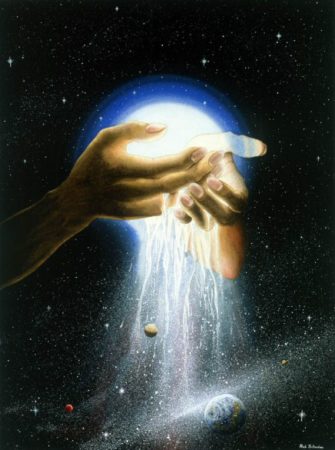 After being released by the Jewish leadership, the apostles pray to the Father, calling him “Sovereign Lord, who made the heaven and the earth, the sea, and everything in them,” (4:24, NRSV) They cite a prophesy of Gentiles and their kings opposing “the Lord and against his Messiah,” which they see fulfilled in their day,
After being released by the Jewish leadership, the apostles pray to the Father, calling him “Sovereign Lord, who made the heaven and the earth, the sea, and everything in them,” (4:24, NRSV) They cite a prophesy of Gentiles and their kings opposing “the Lord and against his Messiah,” which they see fulfilled in their day,
For in this city, in fact, both Herod and Pontius Pilate, with the Gentiles and the peoples of Israel, gathered together against your holy servant Jesus, whom you anointed, to do whatever your hand and your plan had predestined to take place. (4:27)
They pray for boldness and are filled with God’s power, making them bold. (4:29-31) They continue to do signs and wonders, and two of their own are struck dead after lying. (Acts 5:1-16) The high priest has the apostles jailed, but in the middle of the night, an angel lets them out, and the go out and preach in the Temple – but Luke doesn’t summarize this. The Temple guards arrest them. They’re brought before the high priest, who demands to know why his shut-up order has been disobeyed. (Acts 5:17-28) Now the speech:
But Peter and the apostles answered, “We must obey God rather than any human authority. The God of our ancestors raised up Jesus, whom you had killed by hanging him on a tree. God exalted him at his right hand as Leader and Savior that he might give repentance to Israel and forgiveness of sins. And we are witnesses to these things, and so is the Holy Spirit whom God has given to those who obey him. (5:29-32)
 The council is enraged by this, but is convinced to leave the matter to God. The council
The council is enraged by this, but is convinced to leave the matter to God. The council
…ordered them not to speak in the name of Jesus, and let them go. As they left the council, they rejoiced that they were considered worthy to suffer dishonor for the sake of the name. And every day in the temple and at home they did not cease to teach and proclaim Jesus as the Messiah. (5:40-2)
This is not a whole sermon, but it is a testimony to the Jewish leadership, and its content is interesting. Note the summary of their message, which is the same as the thesis statements of all four NT gospels: that Jesus is God’s Messiah. Also observe that the apostles’s God just is the God of the Jews, aka the Father. (See Acts 2:33.) They preach not that God died, but rather, the man Jesus died. At that time, unsurprisingly, God was still alive, and able to bring Jesus back to life. Implicitly, the apostles are saying that the Jewish leadership ought to accept that Jesus is God’s Messiah, and repent of their rejection of him, and be reconciled to God through him. Thus their fury. They are too self-righteous to hear this from these fanatics.
 It’s an interesting question what the apostles mean by saying that “we are witnesses to these things, and so is the Holy Spirit whom [or: the holy spirit which] God has given to those who obey him.” They’re confronting the high priest etc. with evidence. Part of it is testimonial: they have seen and testify to these things. And another “witness” is the spirit. But is this an additional literal witness? When was the Holy Spirit here presented as a speaking character, saying something to the Jewish leadership? Perhaps they mean the spirit to be additional evidence which the high priest and his peep are obligated to consider. In other words, they’re referring to the miraculous works which are being done in the name of Jesus. These can be known through testimony (from people beyond the apostles) and in some cases observation. In this way, there is another “witness,” that is, piece of evidence: God’s power in them, known by its effects, shows that God is truly with them, the followers of Jesus. One ignores their testimony at one’s peril! So maybe God’s spirit is a non-literal “witness” to these facts about the Messiah.
It’s an interesting question what the apostles mean by saying that “we are witnesses to these things, and so is the Holy Spirit whom [or: the holy spirit which] God has given to those who obey him.” They’re confronting the high priest etc. with evidence. Part of it is testimonial: they have seen and testify to these things. And another “witness” is the spirit. But is this an additional literal witness? When was the Holy Spirit here presented as a speaking character, saying something to the Jewish leadership? Perhaps they mean the spirit to be additional evidence which the high priest and his peep are obligated to consider. In other words, they’re referring to the miraculous works which are being done in the name of Jesus. These can be known through testimony (from people beyond the apostles) and in some cases observation. In this way, there is another “witness,” that is, piece of evidence: God’s power in them, known by its effects, shows that God is truly with them, the followers of Jesus. One ignores their testimony at one’s peril! So maybe God’s spirit is a non-literal “witness” to these facts about the Messiah.
On the other hand, perhaps this additional witness is God himself, the Father – another literal witness. By giving this power to the apostles, by working miracles through them in the name of Jesus, he is testifying that this man really is his Messiah. To say that God’s spirit is a witness may just be to say that God is a witness, by means of the power he gives to believers.
Either way, those miracles show that God is with them, and they constitute evidence which is independent of the testimony the apostles give to the above facts.
Note that this chapter is wholly unitarian. The one God is the Father, the creator, not the Trinity. The Trinity is in now way mentioned, referred to, assumed, or implied. No mention is made of Jesus’s deity, pre-existence, or his alleged creation of the world. Some will jump at the characterization of “the holy spirit” here as a “witness” as evidence of its/his distinct personhood, i.e. his being someone in addition to the Father. But this is compatible with both unitarian and trinitarian views of God.
Nothing here is added to our list of things which Luke thinks one most believe in order to be saved. The hostile leaders don’t even get the whole list, but only an abbreviated version, which makes sense, given their unwillingness to hear the apostles out. When you’re being told to shut up, you don’t speechify at length.
Next up: a big, long speech by martyr Stephen.
